新概念英语二册Lesson 53 Hot snake课件(共37张PPT,内嵌音频)
文档属性
| 名称 | 新概念英语二册Lesson 53 Hot snake课件(共37张PPT,内嵌音频) | 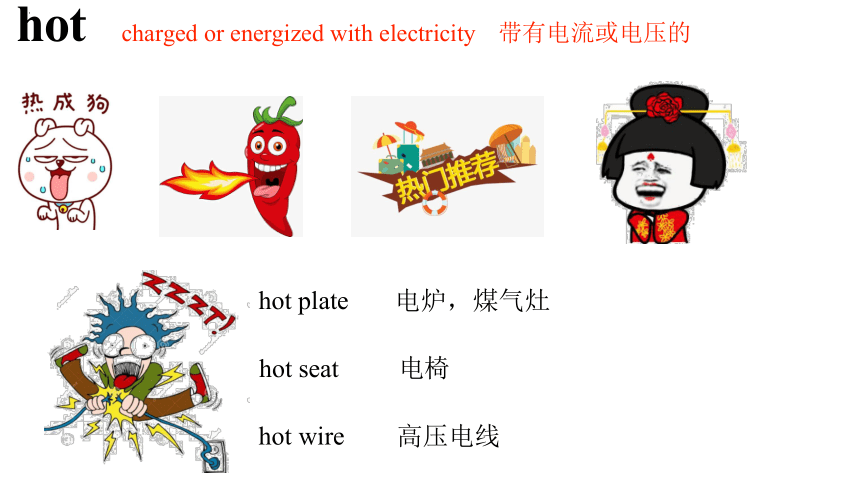 | |
| 格式 | pptx | ||
| 文件大小 | 14.6MB | ||
| 资源类型 | 教案 | ||
| 版本资源 | 新概念英语 | ||
| 科目 | 英语 | ||
| 更新时间 | 2024-02-19 13:53:02 | ||
图片预览

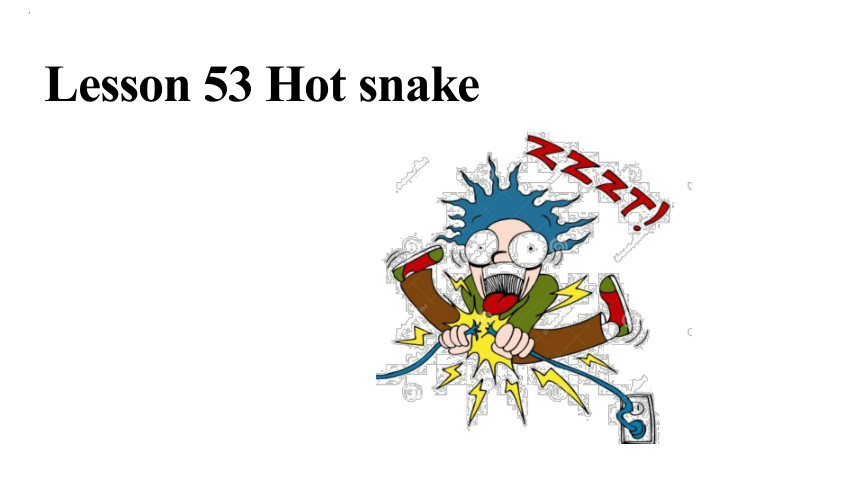
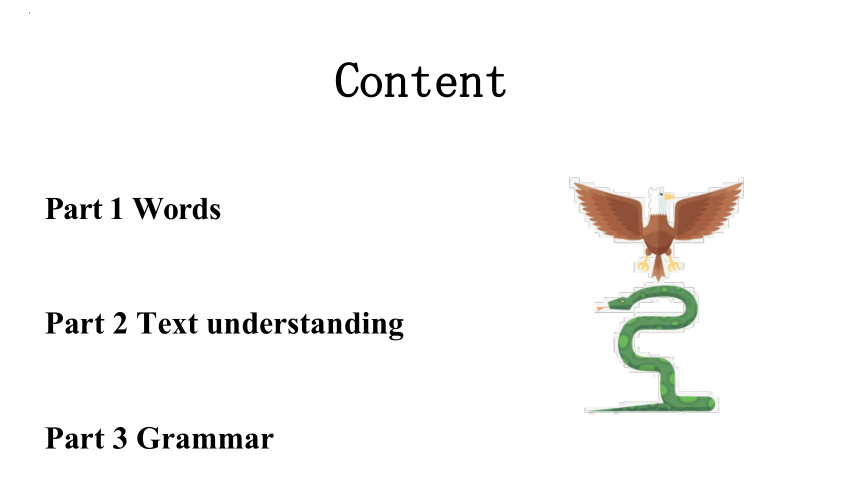
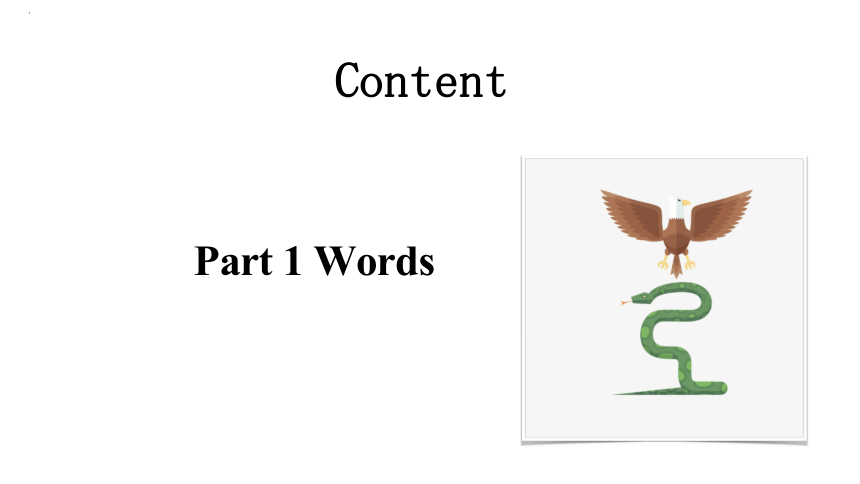
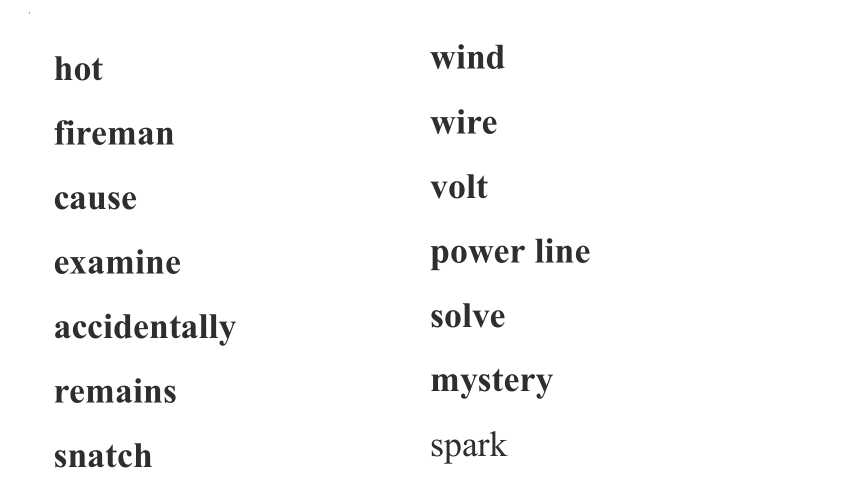
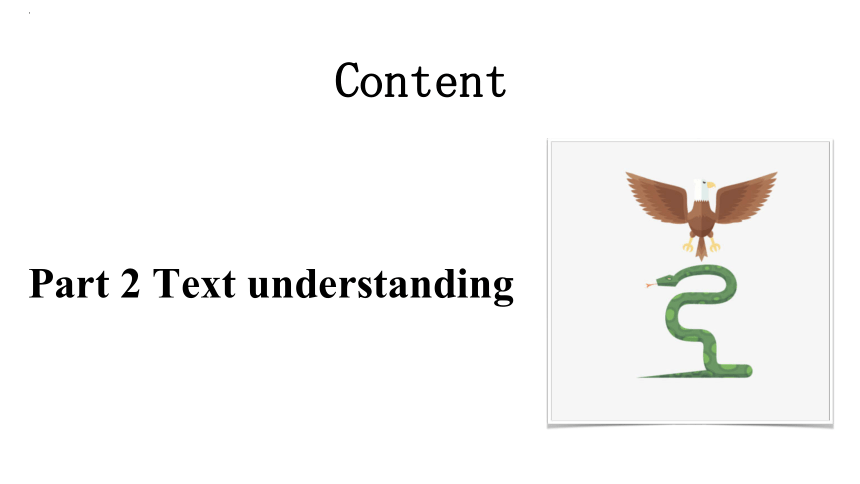
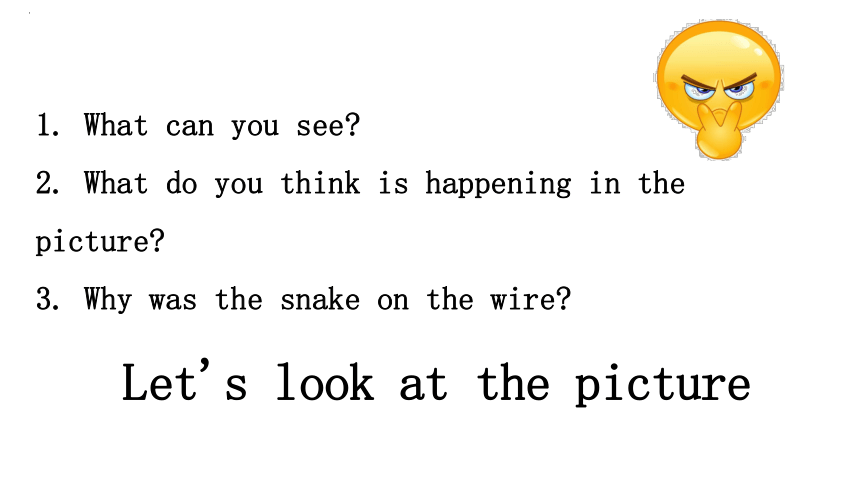
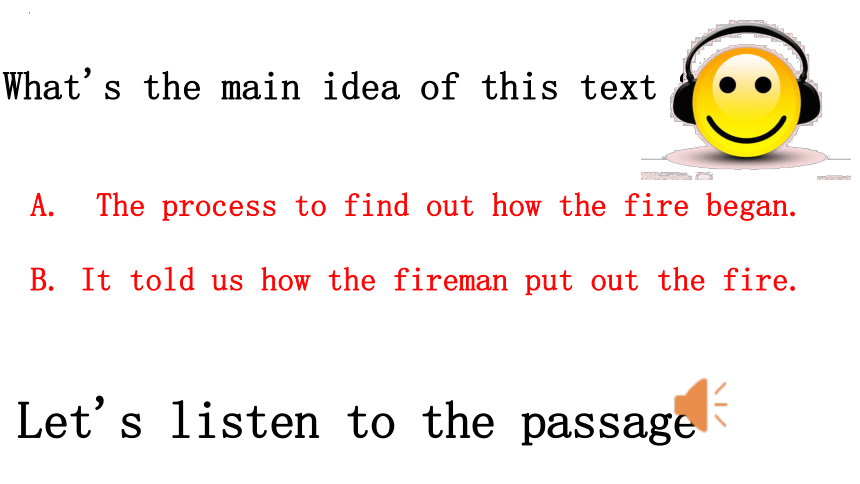
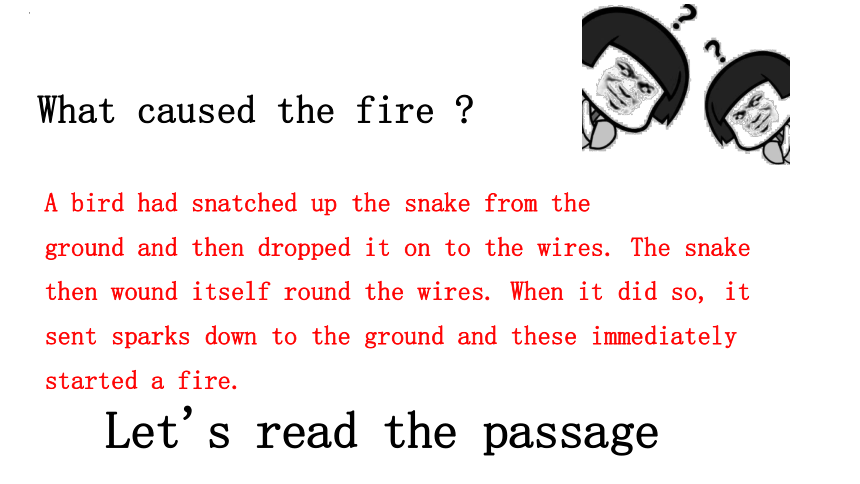
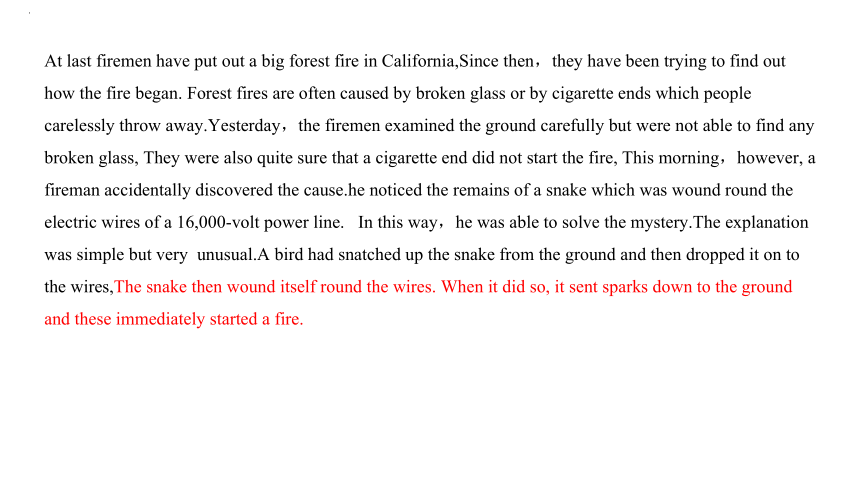
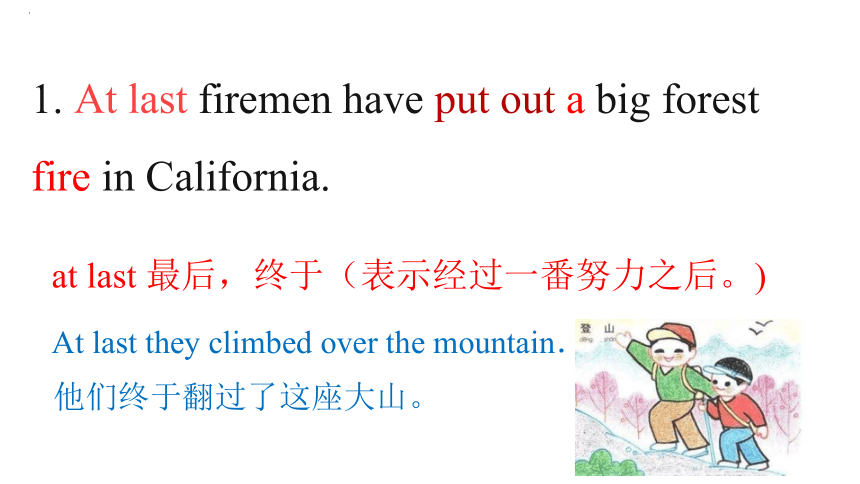
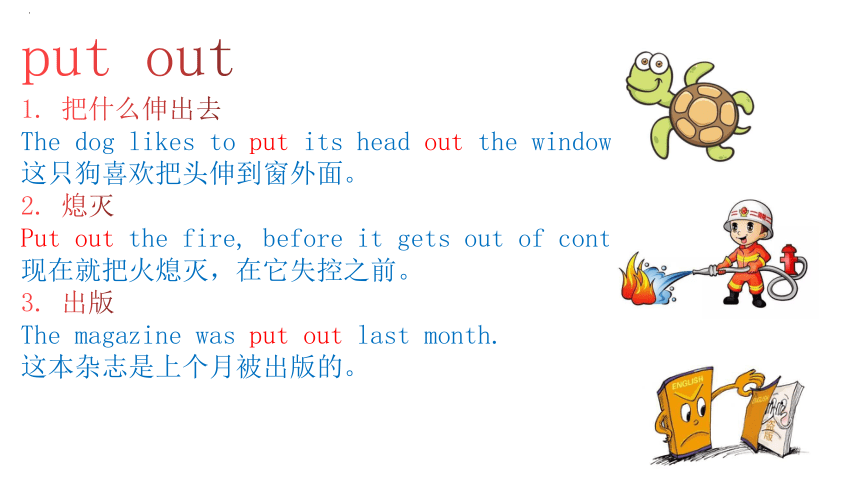
文档简介
(共37张PPT)
hot
charged or energized with electricity
hot plate
电炉,煤气灶
电椅
hot seat
hot wire
高压电线
带有电流或电压的
Lesson 53 Hot snake
Part 1 Words
Part 2 Text understanding
Part 3 Grammar
Content
Part 1 Words
Content
hot
fireman
cause
examine
accidentally
remains
snatch
wind
wire
volt
power line
solve
mystery
spark
Part 2 Text understanding
Content
Let's look at the picture
1. What can you see
2. What do you think is happening in the picture
3. Why was the snake on the wire
Let's listen to the passage
What's the main idea of this text
A. The process to find out how the fire began.
B. It told us how the fireman put out the fire.
Let's read the passage
What caused the fire
A bird had snatched up the snake from the
ground and then dropped it on to the wires. The snake then wound itself round the wires. When it did so, it sent sparks down to the ground and these immediately started a fire.
At last firemen have put out a big forest fire in California,Since then,they have been trying to find out how the fire began. Forest fires are often caused by broken glass or by cigarette ends which people carelessly throw away.Yesterday,the firemen examined the ground carefully but were not able to find any broken glass, They were also quite sure that a cigarette end did not start the fire, This morning,however, a fireman accidentally discovered the cause.he noticed the remains of a snake which was wound round the electric wires of a 16,000-volt power line. In this way,he was able to solve the mystery.The explanation was simple but very unusual.A bird had snatched up the snake from the ground and then dropped it on to the wires,The snake then wound itself round the wires. When it did so, it sent sparks down to the ground and these immediately started a fire.
1. At last firemen have put out a big forest fire in California.
at last 最后,终于(表示经过一番努力之后。)
At last they climbed over the mountain.
他们终于翻过了这座大山。
put out
1. 把什么伸出去
The dog likes to put its head out the window.
这只狗喜欢把头伸到窗外面。
2. 熄灭
Put out the fire, before it gets out of control.
现在就把火熄灭,在它失控之前。
3. 出版
The magazine was put out last month.
这本杂志是上个月被出版的。
2. Since then,they have been trying to find out how the fire began. Forest fires are often caused by broken glass or by cigarette ends which people carelessly throw away.
since then
从那时起,到现在为止
find out
表示经过研究、努力等“发现”、“找出”、“查出”、“得知”
1. I'll try to find out the name of the person who saved my life.
我将设法查出救我命的那个人的姓名。
2. How did you find out about the party
你是怎么知道这个聚会的?
cigarette ends
carelessly
烟头
carefully
throw away
丢弃,丢掉
3. Yesterday,the firemen examined the ground carefully but were not able to find any broken glass, They were also quite sure that a cigarette end did not start the fire,
exam
examine
examiner
be able to can
1. 可以有各种时态,而can只有一般现在和一般过去两种时态。
2. be able to 强调通过努力而获得的能力,而can则强调自身已具有的能力。
① She can sing the song in English.
② He will be able to sing this song in English after training, too.
3. be able to 强调一种结果,而can只强调一种可能。
Luckily, he was able to escape from the fire in the end.
If he got here a few hours earlier, I could save him.
4. can可用于表示可能性,推测,允许等情况,而be able to通常不这样用。
I could help you last night, but you didn’t come.
He will be able to help you.
be sure of/that 对……很有把握
我确信他很快就会回来
I am sure that he will come back soon.
start a fire=cause a fire
start vt(及物动词). 使……发生,引起
I'm having trouble starting the car.
我的车发动不起来。
引起火灾
This morning, however, a fireman accidentally discovered the cause.he noticed the remains of a snake which was wound round the electric wires of a 16,000-volt power line. In this way,he was able to solve the mystery.
discover:
I don't know who discovered America.
discover前加accidentally更加强了“偶然”、“意外”的含义
偶然发现(某个已经存在的东西)
the remains:
“尸体,残骸”
用复数形式
wind vt. wound-wound
vt. 缠绕,卷在…上
vt. 蜿蜒
The snake then wound itself round the tree.
Clouds wind mountains.
She wound her injured leg with a bandage.
The stream winds its way to the river.
小溪蜿蜒着流入河中。
白云在山间缭绕。
她用绷带缠绕住她受伤的腿。
line:
wire:
在这里指“线路”,含义比wire广
指具体的电线、铁丝等
线
in this way
就这样
solve
解决
The explanation was simple but very unusual.A bird had snatched up the snake from the ground and then dropped it on to the wires,
simple:
easy:
侧重事情显而易见,不难懂;
侧重事情的难度小,容易做
snatched up sth from the ground
从地上抓起来
drop vt&vi.
无意掉下去的,使落下,使掉落
茶壶从她手里掉了出来。
The teapot dropped out of her hand。
The snake then wound itself round the wires. When it did so, it sent sparks down to the ground and these immediately started a fire.
so常用于一些动词之后,代指前面提过的某个动作/某件事,以免重复
do so
I refuse to do so.
I think/believe so.
这么做
我拒绝这么做
我也这样认为。
carelessly
discover
wind
start a fire
find out
cigarette ends
in this way
since then
the remains
at last
simple, easy
drop
solve
put out
snatch up
wire, line
throw away
be sure that
so
can,be able to
examine
Part 3 Grammar
Content
1. Yesterday the firemen examined the ground carefully.
2. At last firemen have put out a big forest fire in California.
3. They have been trying to find out how the fire began.
一般过去时
4. He was able to solve the mystery.
现在完成时
现在完成进行时
一般过去时
一般过去时
定义:
结构:
主+was/were +...
主+Ved+...
表示过去某个时间发生的动作或存在的状态,也可表示过去经常或反复发生的动作
现在完成时
定义
结构
主+have/has+V过去分词
表示过去发生的动作对现在造成的影响或结果或表示过去的动作或状态持续到现在。
现在完成时
定义:过发现影, 过发持续
时间标志词:
1. never(从不), ever(曾经), just(只是),already(已经), yet(仍然,还)
2. for+时间段, since+时间点
结构:have/has done
I have learned English.
肯定句
否定句
一般疑问句
回答
特殊疑问句
I have not learned English.
Have you learned English
Yes, I have./ No, I haven't.
What have you learned
He has learned English.
He has not learned English.
Has he learned English
Yes, he has. / No, he hasn't.
What has he learned
现在完成进行时
定义
结构
主+have/has been doing
表示某动作从过去某个时间开始,一直延续到现在,并且还有可能持续下去
√
√
√
√
hot
charged or energized with electricity
hot plate
电炉,煤气灶
电椅
hot seat
hot wire
高压电线
带有电流或电压的
Lesson 53 Hot snake
Part 1 Words
Part 2 Text understanding
Part 3 Grammar
Content
Part 1 Words
Content
hot
fireman
cause
examine
accidentally
remains
snatch
wind
wire
volt
power line
solve
mystery
spark
Part 2 Text understanding
Content
Let's look at the picture
1. What can you see
2. What do you think is happening in the picture
3. Why was the snake on the wire
Let's listen to the passage
What's the main idea of this text
A. The process to find out how the fire began.
B. It told us how the fireman put out the fire.
Let's read the passage
What caused the fire
A bird had snatched up the snake from the
ground and then dropped it on to the wires. The snake then wound itself round the wires. When it did so, it sent sparks down to the ground and these immediately started a fire.
At last firemen have put out a big forest fire in California,Since then,they have been trying to find out how the fire began. Forest fires are often caused by broken glass or by cigarette ends which people carelessly throw away.Yesterday,the firemen examined the ground carefully but were not able to find any broken glass, They were also quite sure that a cigarette end did not start the fire, This morning,however, a fireman accidentally discovered the cause.he noticed the remains of a snake which was wound round the electric wires of a 16,000-volt power line. In this way,he was able to solve the mystery.The explanation was simple but very unusual.A bird had snatched up the snake from the ground and then dropped it on to the wires,The snake then wound itself round the wires. When it did so, it sent sparks down to the ground and these immediately started a fire.
1. At last firemen have put out a big forest fire in California.
at last 最后,终于(表示经过一番努力之后。)
At last they climbed over the mountain.
他们终于翻过了这座大山。
put out
1. 把什么伸出去
The dog likes to put its head out the window.
这只狗喜欢把头伸到窗外面。
2. 熄灭
Put out the fire, before it gets out of control.
现在就把火熄灭,在它失控之前。
3. 出版
The magazine was put out last month.
这本杂志是上个月被出版的。
2. Since then,they have been trying to find out how the fire began. Forest fires are often caused by broken glass or by cigarette ends which people carelessly throw away.
since then
从那时起,到现在为止
find out
表示经过研究、努力等“发现”、“找出”、“查出”、“得知”
1. I'll try to find out the name of the person who saved my life.
我将设法查出救我命的那个人的姓名。
2. How did you find out about the party
你是怎么知道这个聚会的?
cigarette ends
carelessly
烟头
carefully
throw away
丢弃,丢掉
3. Yesterday,the firemen examined the ground carefully but were not able to find any broken glass, They were also quite sure that a cigarette end did not start the fire,
exam
examine
examiner
be able to can
1. 可以有各种时态,而can只有一般现在和一般过去两种时态。
2. be able to 强调通过努力而获得的能力,而can则强调自身已具有的能力。
① She can sing the song in English.
② He will be able to sing this song in English after training, too.
3. be able to 强调一种结果,而can只强调一种可能。
Luckily, he was able to escape from the fire in the end.
If he got here a few hours earlier, I could save him.
4. can可用于表示可能性,推测,允许等情况,而be able to通常不这样用。
I could help you last night, but you didn’t come.
He will be able to help you.
be sure of/that 对……很有把握
我确信他很快就会回来
I am sure that he will come back soon.
start a fire=cause a fire
start vt(及物动词). 使……发生,引起
I'm having trouble starting the car.
我的车发动不起来。
引起火灾
This morning, however, a fireman accidentally discovered the cause.he noticed the remains of a snake which was wound round the electric wires of a 16,000-volt power line. In this way,he was able to solve the mystery.
discover:
I don't know who discovered America.
discover前加accidentally更加强了“偶然”、“意外”的含义
偶然发现(某个已经存在的东西)
the remains:
“尸体,残骸”
用复数形式
wind vt. wound-wound
vt. 缠绕,卷在…上
vt. 蜿蜒
The snake then wound itself round the tree.
Clouds wind mountains.
She wound her injured leg with a bandage.
The stream winds its way to the river.
小溪蜿蜒着流入河中。
白云在山间缭绕。
她用绷带缠绕住她受伤的腿。
line:
wire:
在这里指“线路”,含义比wire广
指具体的电线、铁丝等
线
in this way
就这样
solve
解决
The explanation was simple but very unusual.A bird had snatched up the snake from the ground and then dropped it on to the wires,
simple:
easy:
侧重事情显而易见,不难懂;
侧重事情的难度小,容易做
snatched up sth from the ground
从地上抓起来
drop vt&vi.
无意掉下去的,使落下,使掉落
茶壶从她手里掉了出来。
The teapot dropped out of her hand。
The snake then wound itself round the wires. When it did so, it sent sparks down to the ground and these immediately started a fire.
so常用于一些动词之后,代指前面提过的某个动作/某件事,以免重复
do so
I refuse to do so.
I think/believe so.
这么做
我拒绝这么做
我也这样认为。
carelessly
discover
wind
start a fire
find out
cigarette ends
in this way
since then
the remains
at last
simple, easy
drop
solve
put out
snatch up
wire, line
throw away
be sure that
so
can,be able to
examine
Part 3 Grammar
Content
1. Yesterday the firemen examined the ground carefully.
2. At last firemen have put out a big forest fire in California.
3. They have been trying to find out how the fire began.
一般过去时
4. He was able to solve the mystery.
现在完成时
现在完成进行时
一般过去时
一般过去时
定义:
结构:
主+was/were +...
主+Ved+...
表示过去某个时间发生的动作或存在的状态,也可表示过去经常或反复发生的动作
现在完成时
定义
结构
主+have/has+V过去分词
表示过去发生的动作对现在造成的影响或结果或表示过去的动作或状态持续到现在。
现在完成时
定义:过发现影, 过发持续
时间标志词:
1. never(从不), ever(曾经), just(只是),already(已经), yet(仍然,还)
2. for+时间段, since+时间点
结构:have/has done
I have learned English.
肯定句
否定句
一般疑问句
回答
特殊疑问句
I have not learned English.
Have you learned English
Yes, I have./ No, I haven't.
What have you learned
He has learned English.
He has not learned English.
Has he learned English
Yes, he has. / No, he hasn't.
What has he learned
现在完成进行时
定义
结构
主+have/has been doing
表示某动作从过去某个时间开始,一直延续到现在,并且还有可能持续下去
√
√
√
√
同课章节目录
